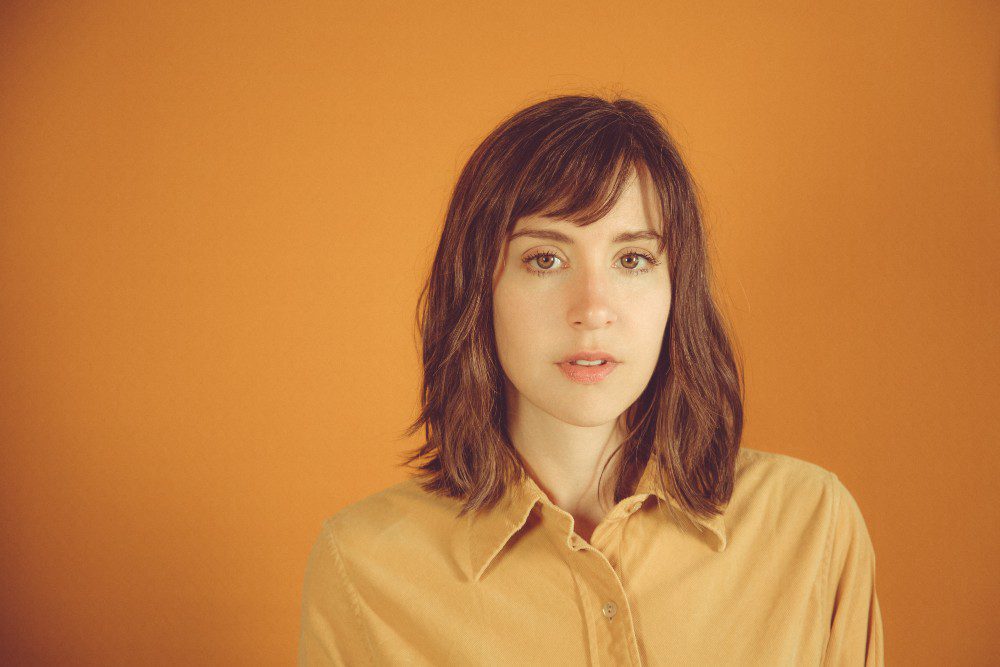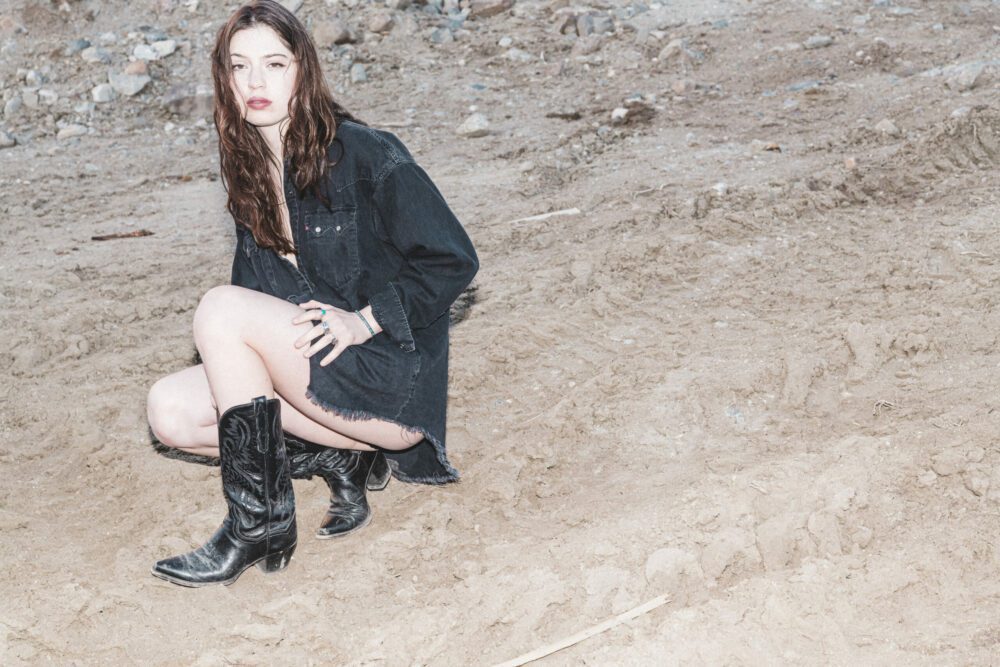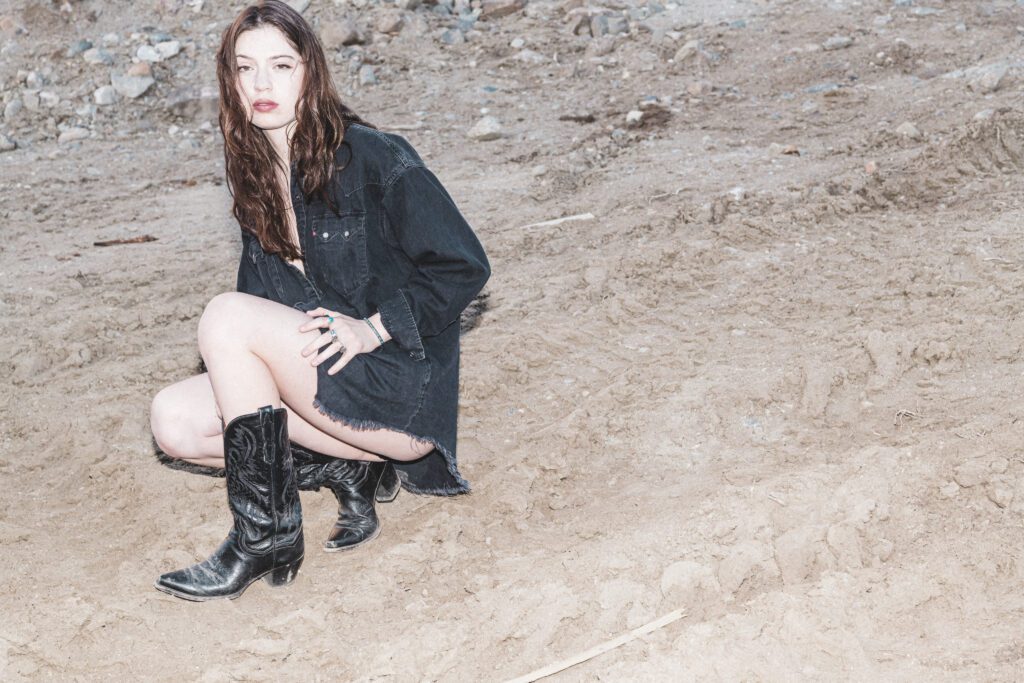Laura Stevenson Is Candid And Confessional On Her Self-Titled Sixth Solo Album


Laura Stevenson’s new album hums with quiet rage, bristling with the nausea of too much feeling, hairs raised, hypersensitive skin, waiting for the touch that either caresses or wounds. There’s more than a subtle reference to jangly, ‘90s, indie solo acts like Liz Phair in the confessional, matter-of-fact attitude embodied by Stevenson’s catchy, candid melodies and lyrics. On ballad “Moving Cars,” there’s such a sadness and resignation as she sings, “No-one teaches you to breathe, slow and feeble like the people that we said we’d never be…”
Try not to hear this song in your head in the darkness right between wakefulness and lucid dreaming, slowly breathing, feebly feeling.
Stevenson cannot go into the specific details, but in 2018, she flew across the country to help a friend who needed it, and in the frenzy and chaos of the time, she was purely on autopilot. It wasn’t until she returned to her home in upstate New York that she could begin to probe the tender feelings she’d restrained.
“Something really horrible had happened to a person that I love, and I can’t go into it because it’s a delicate situation,” she recalls. “I moved to where all that happened so that I could help that person get through it… I was on tour and I had to fly across the country to go and help. I stayed longer than I thought, then I came home, fell apart and started writing.”
A year later, her fifth album The Big Freeze came out, and she embarked on a touring schedule that enabled her to again put her feelings and memories aside. In Ireland, at the end of the tour, she found she was expecting her first child with husband Mike Campbell, the bass player in her band.
“I did some writing and recording during my pregnancy,” she explains. “I had my daughter right before COVID, just as lockdown was starting in March… It was all a healing process, simultaneously healing and organizing all that had happened, because there was a lot of chaos. When I got home, I was sitting in my studio, looking at the trees and thinking about what had happened. I hadn’t processed anything.”
Her home, where she lives with Campbell, her dog and her 15 month-old daughter, is a sanctuary, two hours from Manhattan and far from the Long Island home where she was raised by her hippie father (a Grateful Dead fan) and her showtunes-loving mother. She is only now able to return to writing, after struggling to do anything apart from sleep for the last year.
“I do have a dedicated space, a studio that’s out behind my garage. That’s been okay during COVID, but the lack of ability to be using my time other than catching sleep has been a big roadblock this entire year, because my daughter had a lot of sleep issues,” Stevenson admits. “I was up four times a night, just not sleeping. It’s made this year so difficult for me, because writing is such a way to process what’s going on. All the COVID fear, new baby fear, all that stuff that’s all very raw and still I need to work out, out there in the studio… It’ll be nice to slow down and just work on songs. It makes me feel whole.”
In the post-COVID19 world, people freely admit to their trauma on social media and openly confess to days of staying in bed, or contemplating going on at all. This tectonic shift, invisible to the naked eye, but felt in all of us, is the perfect environment for Stevenson’s album to land. We are hurt, mostly all of us, to different degrees and in different ways, and if you are like me, there is a hesitancy to listen to anything really dark or painful and confronting, anything that requires the emotional stamina to take on other pain.
But to suggest that Stevenson’s album is all dark is untrue and simplistic. On “Continental Divide,” for example, there’s open car windows, the smell of distant burgers from a remote fuel stop diner, the worn vinyl seats sculpted exactly to your body after hours of road tripping and Tom Petty on cassette. There’s a safety in the combination of Americana, folk, country and blues elements that Stevenson sweeps up and joyfully delivers with her own stylish signature sound. Is she aware, at the time, of the artists influencing her songs?
“I’m usually just in it when I’m writing, then later on…” she trails off. “There’s a song on the record called ‘Wretch’ and later I thought ‘this is such an Elliott Smith song!’ I definitely hear it afterwards, but when I’m making it, I’m completely present with it. Elliott Smith is a huge, huge influence of mine for sure. He’s one of the best songwriters of all time.”
Her influences – consciously or not – are familial, too. Stevenson’s grandfather was a composer (“The Little Drummer Boy”) and her grandmother was a jazz singer. When Laura began writing songs and playing guitar post-college, her genetic inheritance for creating and collaboration was wholly natural. She was performing solo, having already penned a bunch of songs, when she joined Bomb the Music Industry! in 2005, and she continued to work on her own music while part of the collective – even recruiting some of the members for her own band.
In 2008, she began working on her debut studio album with a band including Peter Naddeo on guitar, Samantha Niss on drums, Michael Campbell (of punk band Latterman) on bass, and Alex Billig on trumpet and accordion. A Record resulted in 2010, which convinced Don Giovanni Records to sign the band. The year after, with band The Cans, she released Sit Resist, then Wheel in 2013 and Cocksure in 2015. Between each album, Stevenson toured the US and internationally. While her third album had picked up interest by media and she had a solid fan base, it wasn’t until her 2019 album The Big Freeze that she struck chart success (number 11 on Billboard Alternative New Artist Albums, number 41 Billboard Current Alternative Albums).
Those albums established her as an adept lyricist, with a deft hand for pop-friendly rhythm and melody but a playful rebelliousness – even melancholia – that recalls the best of folk-pop-rock legend Mary Lou Lord with just a dash of Elliott Smith (or both, as in this fantastic duet). She weaves sixties girl group harmonies (“I definitely liked The Ronettes. That music, the wall of sound and beautiful voices, was super inspiring to me”), country-glam (a la Nancy Sinatra), pop-Americana (Sheryl Crow vibes) and the sort of confessional, fierce-but-fragile lyrical honesty that PJ Harvey lured her listeners with.
This album – produced by John Agnello – is a gift, in a sense, to both Stevenson and to listeners.
“Now listening to it, it’s healing,” Stevenson says. “A song like ‘State’ was such an embodiment of the anger and rage I felt. There’s a music video my friends made of them smashing things. It was really good for the people involved to see someone acting out all the rage – it was very cathartic for them.”
Follow Laura Stevenson on Facebook and Instagram for ongoing updates.



